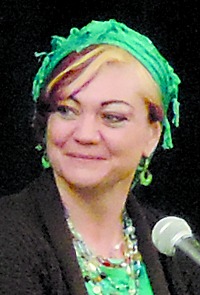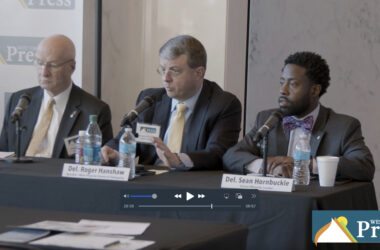
Anna Borsick
WEST LIBERTY, W.Va. — As a 13-year-old girl, Anna Borsick sought escape from her life.
Growing up in Sandusky, Ohio, she had been molested by several men in her short lifetime, and believed the only solution was to run away.
She found asylum with an older man, who cared for her, fed her and, eventually, sold her into the human trafficking market.
“I ran away with an older man who put me into the market,” she said.
Borsick shared her story of survival Wednesday during a Human Trafficking Summit at West Liberty University. She said she was eventually sold to a pimp, and spent several years being bought and sold throughout the country.
“I worked all over the eastern United States until I escaped from the business and turned my life around,” she said.
Although she escaped the trafficking ring, the damage had been done. She said she suffered from Stockholm Syndrome, and battled depression for years, eventually being arrested on federal drug trafficking charges for bringing drugs into the United States from Jamaica.
Since then, Bosick earned a degree in human service management with a focus on child and family services from the University of Phoenix. She is also involved in ministry work reaching out other victims.
Tara Tighe, assistant U.S. attorney for the Northern District of West Virginia, presented statistics showing how big the problem is in West Virginia. She said human trafficking is a modern day version of slavery in which forced labor brings in $150 billion per year for traffickers.
“Unlike drug dealers who sell their product one time, human traffickers sell the same people repeatedly,” she said.
Lt. Daniel Swiger of the State Police Crimes Against Children Unit said local police officers can make a difference if they embrace local runaway children rather than consider them as bad kids who are a nuisance.
“Let’s find out why they are running away,” he said.
Sen. Shelley Moore Capito, R-W.Va., moderated Wednesday’s panel, and said human trafficking is a local problem as much as it is nationwide.
“It is driven by poverty, unemployment and drug abuse,” she said.
Capito is co-sponsoring bipartisan human trafficking legislation she says is “stuck in the politics of a dysfunctional Washington.”
She said the bill, known as the Justice for Victims of Trafficking Act, would establish a Domestic Trafficking Victim’s Fund using court fees and other penalties paid into the criminal justice system. It also aims to improve programs that deter child human trafficking, aid victims of child pornography and increase compensation and restitution for victims of trafficking.
“The bill was passed by a bipartisan vote in the Senate, but Minority Leader Harry Reid did not like some language in it, so he stopped it,” she said.
She said Reid has a problem with language attached to the bill, which bars the use of federal funds to pay for abortions.
Other members of the panel included Sylvia Senften, professor of social work at West Liberty University; psychologist Jennifer Storer; and Brian Morris from the Department of Homeland Security.
To read more from The Intelligencer/Wheeling News-Register, subscribe here.






